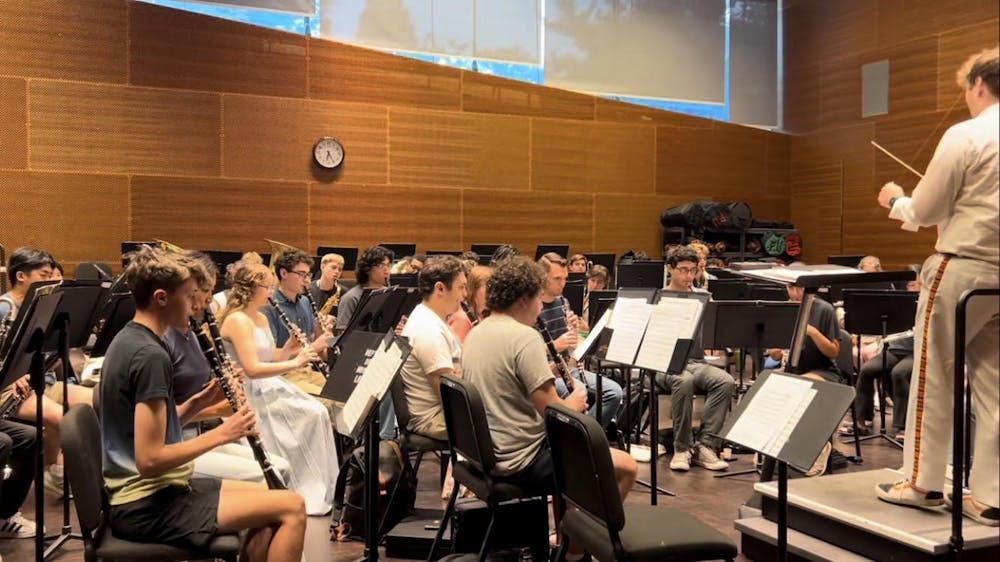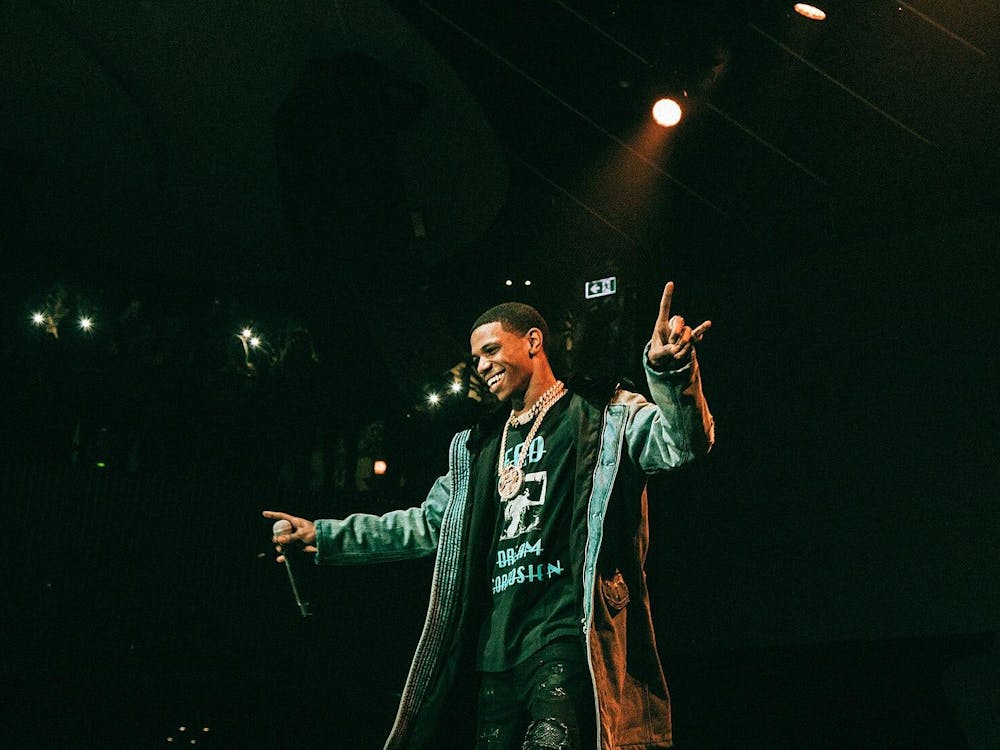Every Saturday from 4:30 to 6:30 p.m. in the Lee Rehearsal Room, members of the Princeton University Wind Ensemble (PUWE) come together and color the room with the distinct but unifying sounds of woodwind, brass, and percussion instruments. Here, they not only work towards the flagship concert they put on at the end of each semester, but they also form a community bonded together by a love for music, performance, and creative expression. The group displays a broad musical repertoire, from classical concert pieces to movie and Broadway scores, and aims to spread their passion for music across campus and beyond.
Jacob Jackson ’26 and Wesley Sanders ’26 played an integral role in reviving PUWE after the group collapsed during the pandemic. I sat down with them to chat about their journeys.
This interview has been edited for clarity and concision.
The Daily Princetonian: Could you each tell us a little bit about yourselves, your background in music, and what music means to you?
Wesley Sanders: I play tuba and trombone in different groups here, one of them being the Wind Ensemble, which I’m the Brass Section leader for. Music has been such a big part of my time at Princeton. It’s really a great means to form community; I’m in a brass quintet in [PUWE], and I think that’s the most fun I’ve had in music at Princeton.
Jacob Jackson: I’m a junior in the music department. I play clarinet and bass clarinet, and some other things for other groups as well. Music has been a huge part of my life. I grew up in a very wind-oriented background, and I was always involved in bands and wind ensembles. Coming into Princeton, I noticed that there was a real lack of that. I thought it would be a really great project to take on to help revive the wind ensemble and make that option for performance available to other students on campus as well.
DP: When you were initially entering Princeton as freshmen, did you have any expectations for what the musical community, specifically the wind symphony community, would look like?
JJ: It was a little bit of a shock to see that not only did Princeton not have an official wind ensemble, but that when it was organized in the past, it was quite lackluster and suffered from attendance and concert reservation issues. I thought that was really disappointing because to me, it has been a huge part of my life.
WS: It was sort of vague what the music department landscape was like. I saw a mention of a wind ensemble on the music department website back when it was a thing, but I was a little disappointed to hear that Wind Ensemble wasn’t currently a thing.
DP: Were there any initial hesitations or doubts you faced as you decided to revive the PUWE?
JJ: Wesley and I came to the same conclusion that there was a gap in the musical community at Princeton in our freshman year, and we started talking about potentially reviving the ensemble. I don't think we really anticipated what that process would look like. We came to know that it’s a much more involved process than one might initially imagine.
The wind ensemble was never officially affiliated with the music department or ODUS, so we had to go through the process of officially writing a constitution and registering it as a student group. The entire process took over a semester and 10 to 20 hours of work a week, as we were building the group from the ground up. It certainly has been a daunting but also very rewarding task.

WS: Aside from all of the logistical hurdles, immediately, we saw a bunch of student interest. We had a few initial rehearsals in Fall 2023 where we just met for fun. Even though it wasn’t going towards a concert, we still had almost full instrumentation. All the parts were covered. One area, especially, was the classical saxophone.
JJ: The saxophone section is definitely the biggest section proportionally. I think classical saxophone is an artistic medium that has been a little bit neglected at Princeton. We saw a very distinct community of musicians who were not served at all with the current groups on campus.
DP: Wesley, could you tell us about your experience as Brass Section leader and what you aim to achieve through your role?
WS: The brass section of the wind ensemble is so great. We have sectionals every week. We have some chamber music with the full ensemble, and then we also have smaller groups, like a quartet and a quintet. It's nice to have a space where I can sort of extend my will and do fun music, and the results have been great. We’re also shaping a community in the brass section: we have brass movie nights, and a lot of us will get dinner after rehearsals.
DP: How does the PUWE hope to connect with the larger Princeton community?
JJ: A big part of our mission is to be as inclusive as we can — in the music we play, the numbers we include, and also in our outreach and concert programming. Part of our concert publicity is reaching out to off-campus sources: local newspapers, local arts organizations, other universities, and just the wider Princeton community and New Jersey community.
We think it’s really important that this group not only exists for the pleasure of its members and to serve the campus community, but also to promote the wind band outside of campus. We had our very first full concert last spring, where people who came to our reception afterward came up to us and remarked how wonderful it was, and that was really meaningful to me.
DP: What do you each find to be the most rewarding aspect of PUWE? How has it shaped your Princeton experience?
WS: Serving as section leader has been so much fun. Seeing the hard work the brass section has put into everything and the community that we’ve built through movie nights and dinners has been really rewarding.
JJ: Serving as president and seeing how far the group has come. I often find myself, at rehearsals or concerts, taking a step back and being astounded at what we’ve created, the wonderful music we’re making, and the community we’ve built. This group is something so special, and I’m excited to see where it goes in the next year and even the next 10 years.
DP: What are your future goals for the PUWE?
JJ: I’d really like to see the group have a more solidified rehearsal and concert schedule and more of a solidified place on campus. I’d like there to be more time given to the music and less time ensuring that the group can survive. A long-term goal is for [PUWE] to become a part of the music department and receive the level of support that other faculty-led ensembles receive. My goal is to get a faculty member on board and get us the same level of recognition and support as faculty-led ensembles.
DP: Stay tuned for future performances from the Princeton University Wind Ensemble to witness the community that Jacob, Wesley, and others have worked hard to create.
Navya Kommu is a contributing writer for The Prospect from Tallahassee, Fla. She is a member of the Class of 2028 and can be reached at nk1599[at]princeton.edu.
Please send any corrections to corrections@dailyprincetonian.com








